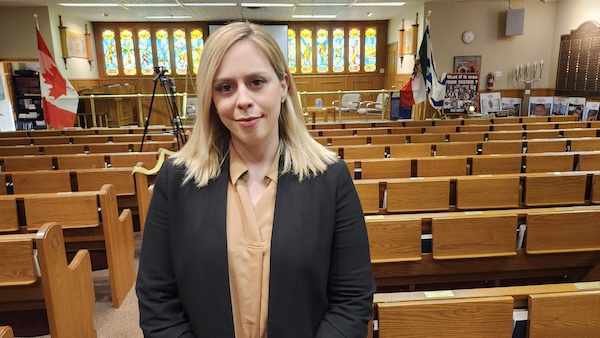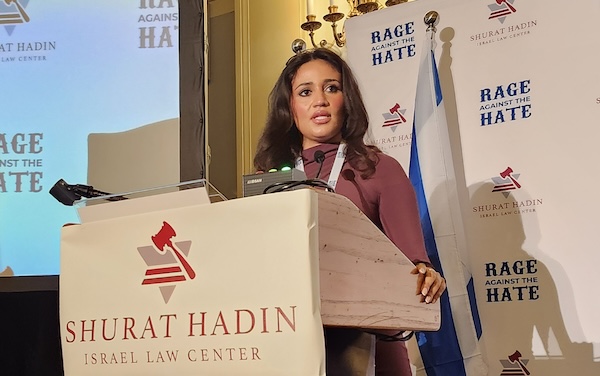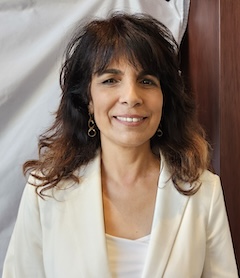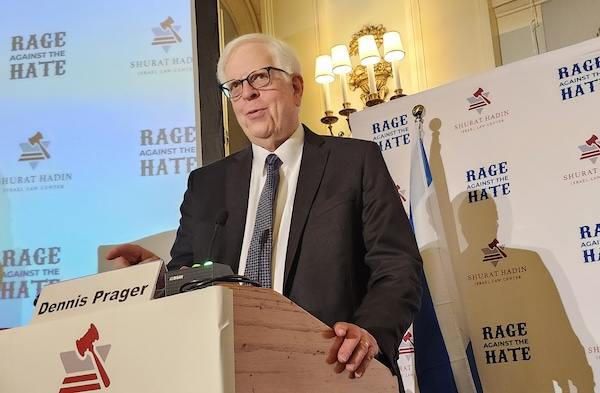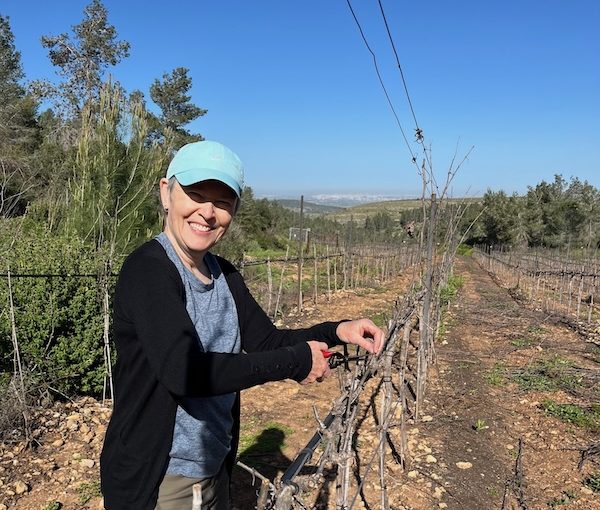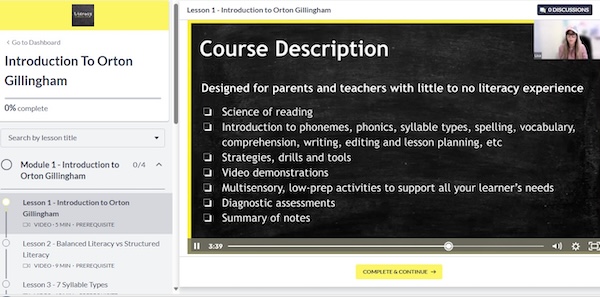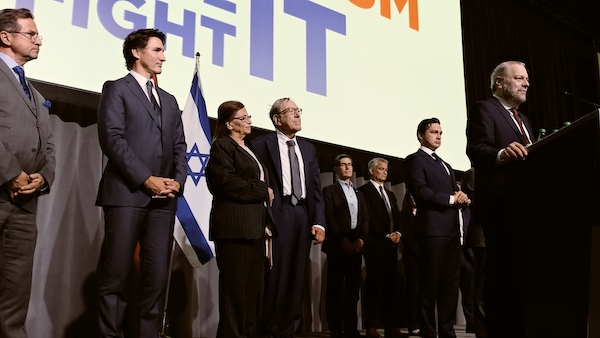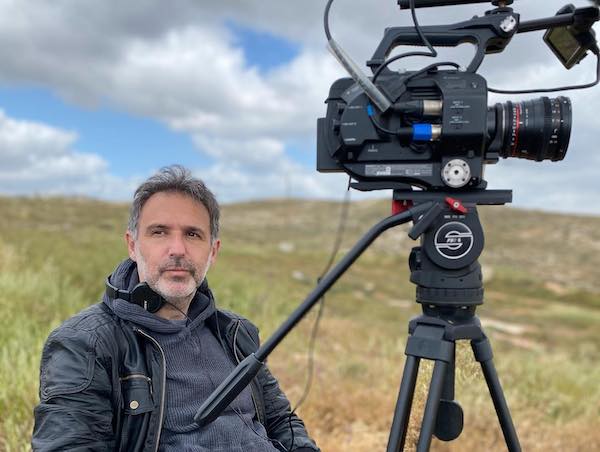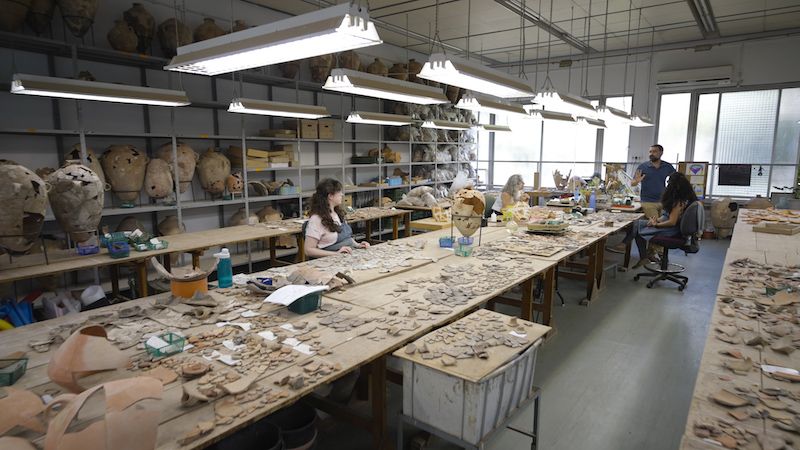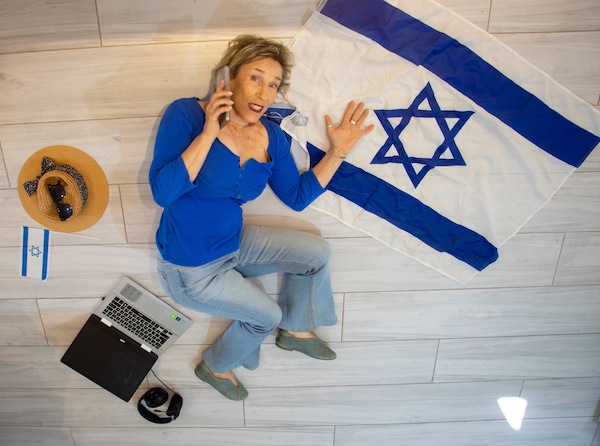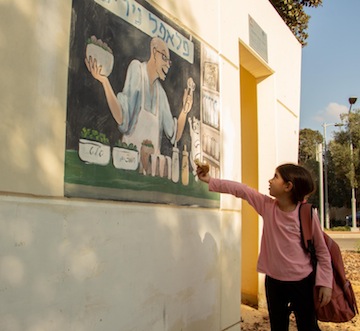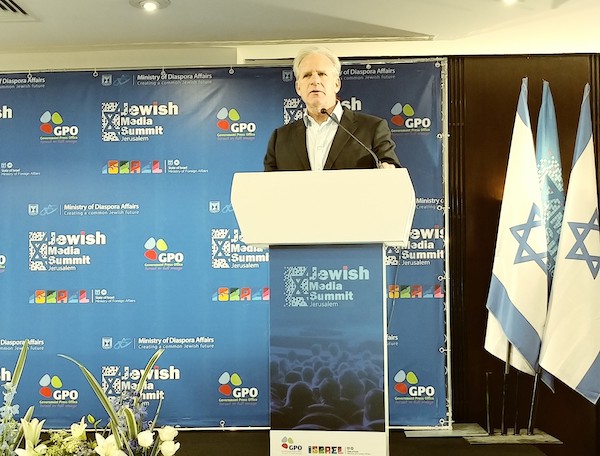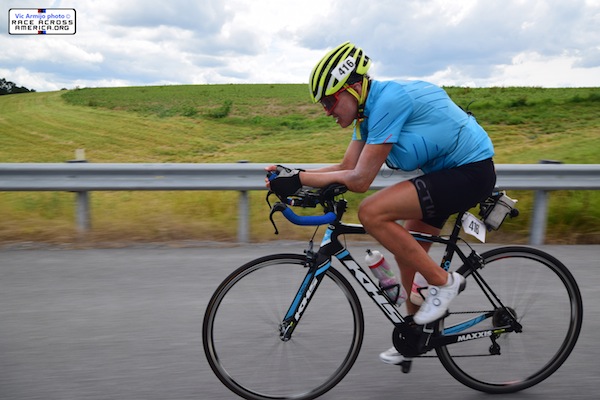In Toronto, Yoseph Haddad, left, with Daniel Koren, founder and executive director of Allied Voices for Israel, which sponsored Haddad’s Canadian tour. (photo by Dave Gordon)
In recent years, Arab-Israeli activist Yoseph Haddad has become known for his efforts to fight antisemitism and present Israel’s perspective to international audiences, and he has taken up this mantle with much greater emphasis since Oct. 7, 2023. This month, Haddad’s Canadian tour, organized by Allied Voices for Israel, took him to Montreal, Calgary, Toronto and Vancouver.
At Toronto’s Shaarei Shomayim Synagogue, Haddad, who leads the Israeli nonprofit Together Vouch For Each Other, which works to bridge the gaps between Arabs and Jews in Israel, covered a few topics. He spoke about how his army service changed his life, how he protested anti-Israel agitators with pro-Israel Concordia students, and what he believes is Canada’s complacency towards antisemitism.
Though he was not obligated to serve in the Israel Defence Forces, Haddad voluntarily enlisted in the army in November 2003, more emboldened to do so after the terrorist bombing of Maxim restaurant in Haifa that left 21 dead and 60 injured. According to Haddad, Maxim was an establishment where the co-owners, employees and patrons were Arabs and Jews. It was an emblem of coexistence in Israel.
Haddad said it was the name of Israel’s army, the Israel Defence Forces, that helped him further understand that the force was defending all people in the country, not just Jews. During his service, he was a commander over Jewish soldiers, and he offered this as one of many examples that punctures the lie that Israel practises apartheid.
He related a story about when he was accused at a public speech of being an “idiot,” of being used by the Jews, and that he would be eventually “thrown to the garbage.” He had an easy rejoinder, he said.
While fighting in the 2006 Lebanon War, he suffered a life-threatening injury four days before the ceasefire, when a Hezbollah antitank missile exploded nearby and severed his leg. At risk to their own lives, his battalion carried him to safety. After treatment and extensive rehabilitation, he can even play soccer. He told the audience, if his unit wanted to throw him away, that would have been the time to do it.
Haddad warned of refugees and immigrants from the Middle East, some of whom, he said, bring extremism to Canada.
“Instead of adopting Western values, instead of adopting Canada’s laws, they’re actually trying to change it to Sharia,” he said. “And that’s the biggest problem.”
Canadian authorities, he said, are “ostriches” who have their heads in the sand.
“When it comes to dealing with extremism and terrorism and terror supporters, zero tolerance [should be the response], and that’s what Canada should do,” said Haddad.
It’s also a lesson for Israel, he added. In June 2023, he said, Hezbollah “infiltrated” Israel and set up in Israeli territory, a situation that Israel dealt with diplomatically. But this gave the terror group the sense that Israel didn’t care much for the land, didn’t care that an enemy had squatted on it, and that Israelis were “scared,” Haddad said. It contributed to Hezbollah’s perception on Oct. 8, 2023, when firing rockets, that “they thought that we are weak, because we presented ourselves as weak.” He said that, if he had been in charge, he would have flown F16s over the tents and bombed them.
The United Nations and the International Criminal Court are “really obvious for bias,” in ignoring the crimes of North Korea, Venezuela, Iran, Cuba, Syria “and other countries who have zero human rights,” said Haddad. The UN “is adopting the narrative of a terrorist organization” when citing casualty numbers from the Hamas-run Gaza Ministry of Health, he added.
Haddad encouraged Israel advocates to speak out on social media: “If you see content which is anti-Israeli, report it. Leave a comment. Leave an Israeli flag. And if you see a pro-Israel comment, support it, share it, show it to other friends, take part in that, because we’re out there.”
Haddad is active on multiple platforms, including YouTube, and he posts content in Hebrew, English and Arabic, with nearly two million followers.
Haddad said he remains optimistic. What uplifted him especially was having seen IDF soldiers in Gaza last summer who included “all the identities of the Israeli society.” They were, he said, united in two missions: find and free the hostages, and eliminate the terrorists. “And the only way that we can be supported,” he said, “is by being united, left and right, Jews and Arabs, secular and religious. And, I promise you, if society is united, there isn’t one single terrorist organization that can beat us.”
At the Toronto talk, journalist and activist Raheel Raza, a Pakistani-Canadian, was honoured for her decades-long allyship to the Jewish community.
At the Vancouver event, which took place at Temple Sholom, speakers included Daniel Koren, founder and executive director of Allied Voices for Israel, and students Zara Nybo and Ben Morrison. Jaime Stein, whose uncle, Dr. Steve Stein, was title sponsor for the cross-Canada tour, also addressed the audience. Grand Chief Lynda Prince, AVI Allyship Award recipient, spoke of Jewish indigeneity and connections between Indigenous Canadians and Israel. David Bogdonov spoke on behalf of the Ronald S. Roadburg Foundation.
Nybo, a University of British Columbia student, is the president of the Israel Club on her campus, though she herself is not Jewish.
“Israel is fighting a seven-front war. We, as students, are fighting on the eighth front of that war – on college and university campuses,” she said. “I am going to war with my peers, my professors, the administration and even the UBC president. I don my hostage pin and head out the door every day into an unknown battlefield of anti-Israel rhetoric, terrorist supporters, and antisemitism.”
Nybo said students are “being brainwashed and fed purposeful disinformation about Israel and the history of the Middle East every single day” while a “prominent” history professor for Middle Eastern studies at UBC wears a keffiyeh on campus, joins pro-Palestine rallies “and encourages his students to do the same for extra credit.”
She said, “I am standing here sounding the alarm about the bias ingrained in the university academic system.”
This “overwhelming systemic issue,” she said, can be confronted with education and by empowering students, as she was. Nybo had a campus media fellowship with AVI and HonestReporting Canada. This helped her hone her writing and editing skills, and her pro-Israel articles have been published in the National Post, Jewish Independent and Algemeiner. She was subsequently accused by a professor as being “employed by Zionist entities,” she said.
But challenges such as these can be faced when students are brought together, she said, “under the banner of allyship, building bridges and empowering students to speak out, all while providing community reinforcement.”
Dave Gordon is a Toronto-based freelance writer whose work has appeared in more than 100 publications around the world. His website is davegordonwrites.com.



